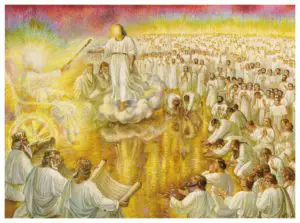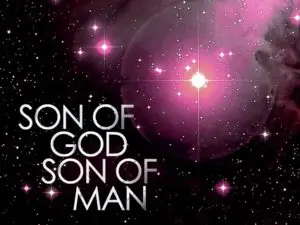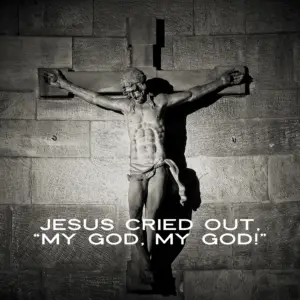Renè Magritte’s self portrait entitled, The Son of Man, is considered to be his most famous piece. In it, the Belgian surrealist is wearing a bowler hat, and his face is partially hidden behind a bright green apple. In simple terms, the concept behind Magritte’s painting is that what is visible is simultaneously hidden.[1]

Today’s post has more in common with Magritte’s painting than simply the title. By examining Scripture, we will discover that Jesus’ identity as the Son of Man has been partially obscured, not by an apple, but by the post-Biblical doctrine of Jesus’ dual natures, also known as the hypostatic union. Unlike Magritte’s painting, we will remove the obstruction to reveal just who this Son of Man is.
Although the phrase “son of man” appears 195 times in Scripture, not everyone is aware of its meaning or its significance. Its usage is split somewhat equally between the Old and New Testaments.[2] In Hebrew, son of man is ben adam. Adam means man or mankind and, as you know, it is the name of the first man God created. Thus, son of man, or son of Adam, is a designation for humanity. One theological textbook succinctly states, “The designation ‘son of man’ simply means ‘human being’ [or] ‘man.'”[3]
It was to Adam, or man, that God gave dominion over His creation:
Genesis 1:26 (NASB) Then God said, “Let Us make man in Our image, according to Our likeness; and let them rule over the fish of the sea and over the birds of the sky and over the cattle and over all the earth, and over every creeping thing that creeps on the earth.” (emphasis added)
The Wycliffe Bible Commentary explains how the first son of man and his offspring fit into God’s kingdom plan:
[Man] was to be God’s responsible representative and steward on earth, to work out his Creator’s will and fulfill the divine purpose. World dominion would be granted to this new creature….This sublime creature, with his unbelievable privileges and heavy responsibilities, was to live and move in a kingly fashion.”[4]
These thoughts are in perfect keeping with Psalm 8 where the focus is on the son of man:
Psalm 8:4-8 (NASB) What is man that You take thought of him, and the son of man that You care for him? 5 Yet You have made him a little lower than God, and You crown him with glory and majesty! 6 You make him to rule over the works of Your hands; You have put all things under his feet, 7 all sheep and oxen, and also the beasts of the field, 8 the birds of the heavens and the fish of the sea, whatever passes through the paths of the seas. [5]
In addition to being a designation for mankind in general, son of man is also used in Scripture to identify specific men. For example, those familiar with Biblical prophecy may recall that God called the prophet Ezekiel “son of man” an incredible ninety three times:
Ezekiel 2:1 (NASB) Then He said to me, “Son of man, stand on your feet that I may speak with you!”
In addition, the prophet Daniel is called “son of man”:
Daniel 8:17 (NASB) So he came near to where I [Daniel] was standing, and when he came I was frightened and fell on my face; but he said to me, “Son of man, understand that the vision pertains to the time of the end.”
The most significant Old Testament usage of “son of man,” and one that gives meaning to the New Testament’s usage of the phrase, comes via a vision given to Daniel regarding the end times:

Daniel 7:13-14 (NASB) “I kept looking in the night visions, and behold, with the clouds of heaven One like a Son of Man was coming, and He came up to the Ancient of Days and was presented before Him. 14 “And to Him was given dominion, glory and a kingdom, that all the peoples, nations and men of every language might serve Him. His dominion is an everlasting dominion which will not pass away; and His kingdom is one which will not be destroyed.
Who is this Son of Man?
Who is this human being who is presented before God and given dominion, glory and an eternal kingdom? According to the Dictionary of the Bible, the phrase Son of Man in Daniel’s vision is ” a messianic title.”[6] The connection between the unnamed Son of Man in Daniel and the promised messiah is an ancient one. Stephen Miller in The New American Commentary on Daniel writes:
The messianic view is the eldest and, in past Jewish and Christian exegesis, the prevailing opinion.[7]
More specifically, Church historian, Kegan Chandler, says this is how Jesus and his contemporaries would have interpreted it:
Jesus, along with other Jews of his day, interpreted the “son of man” figure in Daniel 7:13 messianically.[8]
Some contend that Daniel’s vision of the Son of Man in the heavenly throne room is proof of Jesus’ pre-existence. However, that would entail Jesus pre-existing in heaven as a man, something not even Trinitarians are willing to believe. Moreover, the context reveals it is a prophetic vision and not a real-time look into heaven.
Jesus’ preferred title for himself was “Son of Man”
In the gospels we find evidence that Son of Man was used synonymously with other Messianic titles such as Son of God, King of Israel and Christ:
John 1:49 and 51 (NASB) Nathanael answered Him, “Rabbi, You are the Son of God; You are the King of Israel.”… 51 And He *said to him, “Truly, truly, I say to you, you will see the heavens opened and the angels of God ascending and descending on the Son of Man.” (emphasis added)
Matthew 16:13-16 (NASB) Now when Jesus came into the district of Caesarea Philippi, He was asking His disciples, “Who do people say that the Son of Man is?” 14 And they said, “Some say John the Baptist; and others, Elijah; but still others, Jeremiah, or one of the prophets.” 15 He *said to them, “But who do you say that I am?” 16 Simon Peter answered, “You are the Christ, the Son of the living God.” (emphasis added)
 As the promised Messiah, Jesus referred to himself as the Son of Man over eighty times, more than any other designation. Many claim that it is a reference to Jesus’ human nature, whereas the title, Son of God, is a reference to his divine nature. This is where the true meaning and significance of Jesus as the Son of Man is obscured. Instead of allowing the words to describe Jesus in his entirety in the same way that they describe Adam, Ezekiel and Daniel’s humanity they are used to support a Christology that is outside the bounds of Scripture. Some reason that if the phrase son of man means Jesus is human, then the phrase son of God must mean he is God and thus possesses a divine nature. However, that understanding reflects a lack of knowledge regarding the Biblical use of the term Son of God. Many have been called “son of God” throughout Scripture who were not God. For example, angels and humans, especially those who believe Jesus is the Christ, are called sons of God.[9] But no one would dare claim that Christians who are sons of Adam also posses a divine nature as sons of God.
As the promised Messiah, Jesus referred to himself as the Son of Man over eighty times, more than any other designation. Many claim that it is a reference to Jesus’ human nature, whereas the title, Son of God, is a reference to his divine nature. This is where the true meaning and significance of Jesus as the Son of Man is obscured. Instead of allowing the words to describe Jesus in his entirety in the same way that they describe Adam, Ezekiel and Daniel’s humanity they are used to support a Christology that is outside the bounds of Scripture. Some reason that if the phrase son of man means Jesus is human, then the phrase son of God must mean he is God and thus possesses a divine nature. However, that understanding reflects a lack of knowledge regarding the Biblical use of the term Son of God. Many have been called “son of God” throughout Scripture who were not God. For example, angels and humans, especially those who believe Jesus is the Christ, are called sons of God.[9] But no one would dare claim that Christians who are sons of Adam also posses a divine nature as sons of God.
Scripture never teaches that Jesus has dual natures, rather the doctrine can be shown to have developed over time. In his heavily researched book, Chandler documents where the Gnostic teaching of dualism intersected with Christianity. He writes that a widely popular and influential second century Gnostic Christian teacher named Valentinus:
…promoted a highly developed doctrine of the dual natures of Jesus long before the ecumenical councils of the Catholic Church ever met. At every step, the comparison becomes more concerning: one Valentinian document declares that Christ was “possessing the humanity and the divinity… originally from above… before this structure of the cosmos came into being,” while later orthodox Trinitarian statements also read that Christ was possessing “divinity and humanity together” and was “begotten of the Father before all worlds.”[10] (emphasis added)
Scripture, on the other hand, teaches that God is not a human:
Numbers 23:19 (NASB) “God is not a man, that He should lie, Nor a son of man, that He should repent; Has He said, and will He not do it? Or has He spoken, and will He not make it good?[11] (emphasis added)
 Nevertheless, the obfuscation of Jesus’ true humanity proliferated through the centuries causing turmoil at every step until the Council of Chalcedon (451 AD) declared the post-Biblical doctrine orthodoxy. However, even today Trinitarians have a difficult time articulating just how these two natures operate, especially in light of Scripture.
Nevertheless, the obfuscation of Jesus’ true humanity proliferated through the centuries causing turmoil at every step until the Council of Chalcedon (451 AD) declared the post-Biblical doctrine orthodoxy. However, even today Trinitarians have a difficult time articulating just how these two natures operate, especially in light of Scripture.
Jesus is the Son of Man in Daniel’s Prophecy
With regard to Daniel’s prophecy, Jesus twice applies it to himself. The first time is in the company of his disciples when he is instructing them about his return and the signs of the end of the age. The second time is when he is on trial before the Sanhedrin:
Spoken to his disciples: Matthew 24:30 (NASB) “And then the sign of the Son of Man will appear in the sky, and then all the tribes of the earth will mourn, and they will see the SON OF MAN COMING ON THE CLOUDS OF THE SKY with power and great glory. (emphasis added)
Spoken before Sanhedrin: Matthew 26:63-68 (NASB) But Jesus kept silent. And the high priest said to Him, “I adjure You by the living God, that You tell us whether You are the Christ, the Son of God.” 64 Jesus *said to him, “You have said it yourself; nevertheless I tell you, hereafter you will see THE SON OF MAN SITTING AT THE RIGHT HAND OF POWER, and COMING ON THE CLOUDS OF HEAVEN.” 65 Then the high priest tore his robes and said, “He has blasphemed! What further need do we have of witnesses? Behold, you have now heard the blasphemy; 66 what do you think?” They answered, “He deserves death!” 67 Then they spat in His face and beat Him with their fists; and others slapped Him, 68 and said, “Prophesy to us, You Christ; who is the one who hit You?” (emphasis added)
Notice that the high priest charged Jesus with blasphemy, not because he claimed to be God, but because he claimed to be the Son of Man in Daniel’s prophecy, that is the promised Messiah (Christ).
 Others also made the connection between Jesus and Daniel’s heavenly vision. When Stephen, one of the deacons of the early Church, was arrested and brought before the Sanhedrin, he saw the exalted Son of Man standing at the right hand of the glory of God. Daniel had prophetically seen the Son of Man in God’s heavenly court, but Stephen saw the prophecy realized:
Others also made the connection between Jesus and Daniel’s heavenly vision. When Stephen, one of the deacons of the early Church, was arrested and brought before the Sanhedrin, he saw the exalted Son of Man standing at the right hand of the glory of God. Daniel had prophetically seen the Son of Man in God’s heavenly court, but Stephen saw the prophecy realized:
Acts 7:54-56 (NASB) Now when they heard this, they were cut to the quick, and they began gnashing their teeth at him. 55 But being full of the Holy Spirit, he gazed intently into heaven and saw the glory of God, and Jesus standing at the right hand of God; 56 and he said, “Behold, I see the heavens opened up and the Son of Man standing at the right hand of God.” (emphasis added)
Notice that God is designated as being someone other than Jesus. Indeed, Jesus is not God, but is at God’s right hand.
In addition to Stephen’s understanding of Jesus as the human Messiah, John wrote to the seven churches listed in Revelation. Notice the references to Daniel’s prophecy:
Revelation 1:4-7 (NASB) John to the seven churches that are in Asia: Grace to you and peace, from Him who is and who was and who is to come, and from the seven Spirits who are before His throne, 5 and from Jesus Christ, the faithful witness, the firstborn of the dead, and the ruler of the kings of the earth. To Him who loves us and released us from our sins by His blood— 6 and He has made us to be a kingdom, priests to His God and Father—to Him [Jesus] be the glory and the dominion forever and ever. Amen. 7 BEHOLD, HE IS COMING WITH THE CLOUDS, and every eye will see Him, even those who pierced Him; and all the tribes of the earth will mourn over Him. So it is to be. Amen. (emphasis added)
How did the Son of Man in Daniel’s vision come to be the ruler of the kings of the earth? To those who say God would not give the kingdom to a man, we must recall that God first entrusted Creation to a man, namely Adam. Because of sin, however, Adam was disqualified. But God’s plan, as spoken of in Psalm 8, remained. A man would be given glory, majesty and authority to rule on God’s behalf:
Psalm 8:4-6 (NASB) What is man that You take thought of him, and the son of man that You care for him? 5 Yet You have made him a little lower than God, and You crown him with glory and majesty! 6 You make him to rule over the works of Your hands; You have put all things under his feet
Indeed, while God has subjugated all things to the Son of Man, it is important to remember that God Himself is not in subjection to Jesus:
1 Corinthians 15:27-28 (NASB) For He [God] has put all things in subjection under his [Jesus’] feet. But when He [God] says, “All things are put in subjection,” it is evident that He is excepted who put all things in subjection to him [Jesus]. 28 When all things are subjected to Him [God], then the Son himself also will be subjected to the One who subjected all things to him, so that God may be all in all. (emphasis added)
If Jesus is God, all things would, by default, be under his feet. However, if Jesus is truly the Son of Man, the human Messiah, the meaning of these and many other passages becomes crystal clear. They no longer require a post-Biblical explanation like the theory of the hypostatic union to be reconciled.
The reason for the exaltation of Daniel’s Son of Man was not be because he was also deity, something that is not even remotely hinted at in Scripture. Rather as can be clearly seen in Paul’s letter to the Philippians, it was because of his obedience to do the will of God, even unto death:
Philippians 2:8-11 (NASB) Being found in appearance as a man, He humbled Himself by becoming obedient to the point of death, even death on a cross. 9 For this reason also, God highly exalted Him, and bestowed on Him the name which is above every name, 10 so that at the name of Jesus EVERY KNEE WILL BOW, of those who are in heaven and on earth and under the earth, 11 and that every tongue will confess that Jesus Christ is Lord, to the glory of God the Father. (emphasis added)
If Jesus were God he would not need to be given dominion, glory and a kingdom as he would inherently possess them. But for the human Messiah, they were rewards for his obedience to his God. Even Jesus’ lordship was given to him by God. It was not a position inherently his.
Acts 2:36 (NASB) “Therefore let all the house of Israel know for certain that God has made Him both Lord and Christ—this Jesus whom you crucified.”
Acts 5:31 (NASB) “He is the one whom God exalted to His right hand as a Prince and a Savior, to grant repentance to Israel, and forgiveness of sins.
God cannot be exalted to a position that He already holds. But the human Messiah, the Son of Man, was exalted–not because he is deity–but because of his obedience to Deity. Moreover, the ultimate aim of Jesus’ exaltation is the glory of God the Father. If Jesus is God, we would expect it to be for his own glory or that of the Trinity.
The title Son of Man is significant because it acknowledges Jesus’ humanity in a way that helps us see that even though Adam, the first son of man fell short of his charge, God’s plan for man to rule over the works of His hands (Genesis 1; Psalm 8) was not thwarted. Paul writes that the first Adam was a “type of him who was to come.”[13] Jesus, as the Last Adam,[14] was sent by God to restore what the first Adam lost:[15]
Acts 3:19-21 (NASB) “Therefore repent and return, so that your sins may be wiped away, in order that times of refreshing may come from the presence of the Lord; 20 and that He may send Jesus, the Christ appointed for you, 21 whom heaven must receive until the period of restoration of all things about which God spoke by the mouth of His holy prophets from ancient time. (emphasis added)
As Unger’s Bible Dictionary states, the title Son of Man:
portrays Him [Jesus] as the Representative Man. It designates Him as the ‘last Adam’ in distinction to the ‘first man Adam’ (1 Cor. 15:45).[16] (emphasis added)
This is in direct contrast to the para-Biblical notion held by some that a God-Man (a term never used in Scripture) and not a true human, will rule. Remarkably, it is through the exalted Son of Man in Daniel’s prophecy that kingdom rule, once lost under the first Adam, will ultimately be restored to the sons of Adam who follow Jesus:[17]
Daniel 7:27 (NASB) ‘Then the sovereignty, the dominion and the greatness of all the kingdoms under the whole heaven will be given to the people of the saints of the Highest One; His kingdom will be an everlasting kingdom, and all the dominions will serve and obey Him.’ (emphasis added)
Revelation 5:9-10 (NASB) And they *sang a new song, saying, “Worthy are You to take the book and to break its seals; for You were slain, and purchased for God with Your blood men from every tribe and tongue and people and nation. 10 “You have made them to be a kingdom and priests to our God; and they will reign upon the earth.” (emphasis added)
For too long, a post-Biblical orthodoxy has obscured the true identity and significance of Jesus as the Son of Man. It is time for the Biblical understanding to be re-established so that Jesus is honored as the human Messiah who overcame temptation, suffering and death to restore dominion to those who follow him.
[1] “The Son of Man,” Wikipedia, accessed 7-26-19, https://en.wikipedia.org/wiki/The_Son_of_Man
[2] son of man occurs 107 times in the Old Testament and 88 times in the New Testament.
[3] W.S. Lasor, D.A. Hubbard, F. W. Bush, Old Testament Survey: The Message, Form and Background of the Old Testament, (Grand Rapids: Eerdmans, 1996 [1982]), p. 581.
[4] The Wycliffe Bible Commentary, Charles F. Pfeiffer, ed., (Chicago, IL: Moody Press, 1962), p. 4.
[5] The author of Hebrews applies this passage to Jesus: Hebrews 2:5-8
[6] “Son of Man,” Dictionary of the Bible, John L. McKenzie (New York, NY: Macmillian Publishing Company, 1965), p. 831.
[7] Stephen Miller, The New American Commentary: Daniel, (Broadman & Homman Publishers, 1994), p.209.
[8] Kegan A. Chandler, The God of Jesus in Light of Christian Dogma, (McDonough, GA: Restoration Fellowship, 2016) p.329 (See footnote 1107)
[9] For example: Genesis 6:2; Job 1:6; Matthew 5:9; Galatians 3:26. See the post for more information “Son of God: Proof of Jesus’ Deity?”
[10] Kegan A. Chandler, The God of Jesus in Light of Christian Dogma, (McDonough, GA: Restoration Fellowship, 2016), p. 96.
[11] 1 Samuel 15:29
[12] Acts 2:36, 5:51
[13] Romans 5:14
[14] 1 Corinthians 15:45
[15] Matthew 17:11
[16] “Son of Man,” Unger’s Bible Dictionary, Merrill F. Unger, (Chicago: Moody Press, 1966), p. 1038.
[17] Revelation 1:6; 3:21; 5:10; 20:4, 6; 22:5.



